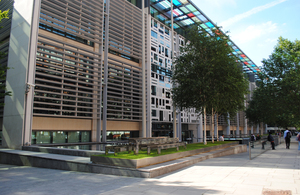Knife robberies fall under dedicated new taskforce
Communities hit hardest by knife crime see a drop in offences and more weapons removed from the streets.

The number of robberies involving a knife – or the threat of one – have dropped after months of targeted police action in seven highest risk areas, according to new data published by government today.
After seeing a stark rise in knife-enabled robbery in the year to June 2024, driven by a 14% increase across seven police forces, the Home Secretary set up a dedicated police taskforce last October and after just nine months of activity, there has been a 6% overall reduction compared with the previous year across those highest risk areas – with places like the West Midlands seeing a substantial annual drop of 25%.
The reduction has been driven by intense police efforts and a range of tactics, including upping visible patrols, using drones, knife arches and detection dogs to support police on the ground, and deploying plain clothes officers.
Home Secretary, Yvette Cooper:
Since day one we have acted with urgency to turn the tide on knife crime, which destroys lives and devastates communities.
When we came to office, knife-enabled robbery was increasing at a concerning rate, but we have now started to drive numbers of those offences down through the work of our dedicated taskforces, and as a result, we have also seen the first small reduction in overall knife crime for four years.
The drop in knife enabled robbery in key problem areas shows the impact that our strong new action on knife crime is having, but we now need to supercharge these efforts through more smart and targeted interventions. Anyone can be a victim of knife crime, but new ‘hex mapping’ technology shows that the vast majority of knife crime is concentrated in a relatively small, hyper concentrated number of areas.
As part of the Plan for Change, we will use that new technology to support our mission to halve knife crime over the next decade. In the 2020s, the way to be ‘tough on crime and tough on the causes of crime’ is also to be smart on crime, using the latest technology to target criminals and problem areas, and keep the country safe.
The announcement comes as a ban on ninja swords come into force today – the first part of the government’s manifesto commitment to introduce Ronan’s Law, and latest step under the pledge to halve knife crime in the next decade.
Ahead of the ban, at least a thousand deadly weapons have been handed in following the country’s largest weapons surrender scheme.
Launched in June, the Home Office developed this scheme with members of the Coalition to Tackle Knife Crime to provide a broader range of ways the public could surrender weapons outside of police stations. This saw Faron Paul, CEO of FazAmnesty, driving a custom built and fully secure surrender van, across London, Greater Manchester and the West Midlands, and Words4Weapons supplying 37 new surrender bins, all funded by the Home Office. The surrender van will also be deployed at this year’s Notting Hill Carnival.
Pooja Kanda, knife crime campaigner and mother to Ronan said:
Ronan was just 16 years old when his life was stolen by a 22-inch ninja sword that should never have been so easy to buy. Ronan’s Law is not only a step towards justice for my son, but for every parent who wants to see their child come home safely.
This law is about saving lives, closing dangerous loopholes, and holding those responsible to account.
The government’s knife surrender scheme has been a sign of commitment to tackling the scourge of knife crime. While there is still much more to do, these are significant steps in the right direction.
Sandra Campbell, CEO of Word 4 Weapons said:
For over 16 years, Word 4 Weapons has played a leading role in the UK’s national weapon surrender schemes, enabling thousands of knives and dangerous items to be taken off the streets through our network of secure and accessible surrender bins.
These initiatives are designed to help save lives, raise awareness, and give communities a practical way to reduce harm.
We therefore welcome the government’s decision to ban dangerous weapons like ninja swords, a move that reinforces the importance of community-led approaches to tackling knife and weapon-related violence. We remain committed to supporting this work and expanding our efforts to build safer public spaces for all.
Ronan’s Law will also see the government bring in the toughest measures to date to tackle the sale of weapons online – requiring retailers to report bulk or suspicious knife orders to the police; put in place more stringent age verification checks and impose significant fines on tech executives whose platforms fail to prevent illegal sales.
As part of the government’s mission to halve knife crime over the next decade the Home Office is also delivering a pilot using sophisticated new mapping technologies to target hyper concentrated knife crime hotspots, backed by up to £5 million this year.
This funding will be targeted towards 50 of the top 100 hyper local knife crime hotspots to trial targeted intervention tactics and prevent further offending. This could include using more facial recognition and advanced knife detection technology, or the use of police drones to support the increased presence of police officers in our communities – part of the government’s Neighbourhood Policing Guarantee.
These activities are taking place against the backdrop of the summer long Safer Streets Initiative launched by the Home Secretary to tackle town centre crime, which is delivering a smarter, more visible police and community operation across the country.